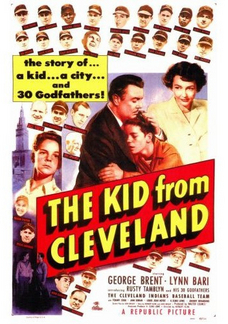This article needs additional citations for verification .(June 2019) |
| The Kid from Cleveland | |
|---|---|
 | |
| Directed by | Herbert Kline |
| Screenplay by | John Bright |
| Story by | Herbert Kline John Bright |
| Produced by | Walter Colmes |
| Starring | George Brent Lynn Bari Russ Tamblyn Tommy Cook Ann Doran Louis Jean Heydt K. Elmo Lowe John Beradino |
| Cinematography | Jack Marta |
| Edited by | Jason H. Bernie |
| Music by | Nathan Scott |
Production company | Herbert Kline Productions |
| Distributed by | Republic Pictures |
Release dates |
|
Running time | 89 minutes |
| Country | United States |
| Language | English |
The Kid from Cleveland is a 1949 sports drama film starring George Brent, Lynn Bari and Russ Tamblyn, directed by Herbert Kline, and released by Republic Pictures.
Contents
- Plot
- Cast
- Cleveland Indians in the cast
- Uncredited Cleveland Indians in the cast
- Baseball umpires (special thanks given in the credits)
- Production
- See also
- References
- External links
The real-life Indians had just won the 1948 World Series, and many of the team's players made appearances in the film, as well as owner Bill Veeck, co-owner and former Major League Baseball star Hank Greenberg, and then current coach and Baseball Hall-of-Famer Tris Speaker. Also featured were the team's then current and former ballparks, Cleveland Municipal Stadium and League Park. Several Cleveland Indians and Boston Braves players also appear in the film in archive baseball footage segments from the 1948 World Series. Footage of football of the Cleveland Browns and hockey of the Cleveland Barons is also featured.